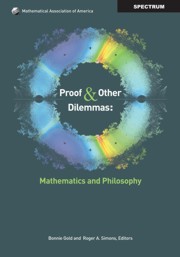Book contents
- Frontmatter
- Contents
- Acknowledgments
- Introduction
- I Proof and How it is Changing
- II Social Constructivist Views of Mathematics
- III The Nature of Mathematical Objects and Mathematical Knowledge
- IV The Nature of Mathematics and its Applications
- 12 Extreme Science: Mathematics as the Science of Relations as Such
- 13 What is Mathematics? A Pedagogical Answer to a Philosophical Question
- 14 What Will Count as Mathematics in 2100?
- 15 Mathematics Applied: The Case of Addition
- 16 Probability—A Philosophical Overview
- Glossary of Common Philosophical Terms
- About the Editors
15 - Mathematics Applied: The Case of Addition
from IV - The Nature of Mathematics and its Applications
- Frontmatter
- Contents
- Acknowledgments
- Introduction
- I Proof and How it is Changing
- II Social Constructivist Views of Mathematics
- III The Nature of Mathematical Objects and Mathematical Knowledge
- IV The Nature of Mathematics and its Applications
- 12 Extreme Science: Mathematics as the Science of Relations as Such
- 13 What is Mathematics? A Pedagogical Answer to a Philosophical Question
- 14 What Will Count as Mathematics in 2100?
- 15 Mathematics Applied: The Case of Addition
- 16 Probability—A Philosophical Overview
- Glossary of Common Philosophical Terms
- About the Editors
Summary
From the Editors
In this chapter, Mark Steiner first describes what makes the applicability of mathematics a thorny philosophical problem—and explains that it is really two problems, one that the philosophers have been discussing and a quite different one that physicists have been asking. He then concentrates on one aspect of the problem, which at first seems quite unproblematic, the question of addition. It leads to a better understanding of what Wigner might have meant when he asked, many years ago, about the “Unreasonable Effectiveness of Mathematics in the Natural Sciences.”
Mark Steiner is a Professor of Philosophy in the Faculty of Humanities at the Hebrew University of Jerusalem (socrates.huji.ac.il/Prof–Mark–Steiner.htm). His interests include philosophy of mathematics, philosophy of science, Wittgenstein, and Hume. He has worked on philosophical issues in contemporary mathematics education.
In the first paragraph of this chapter, he has written “to the extent one can talk about a ‘consensus’ of the philosophical community, I'm not in it.” This is because he has consistently worked, independently of the trends in the philosophy of mathematics, on issues involving how mathematics is actually practiced. His work has several times been far ahead of that of his contemporaries. His book, Mathematical Knowledge, published in 1975, was one of the first works to say that none of the traditional foundational schools—logicism, formalism, intuitionism—describe how mathematicians come to have mathematical knowledge. Mathematical knowledge cannot be identified with formal proofs, as mathematicians very rarely give formal proofs. Also, some informal arguments have actually produced mathematical certainty, or near certainty, as in some of the work of Euler.
- Type
- Chapter
- Information
- Proof and Other DilemmasMathematics and Philosophy, pp. 313 - 322Publisher: Mathematical Association of AmericaPrint publication year: 2008

